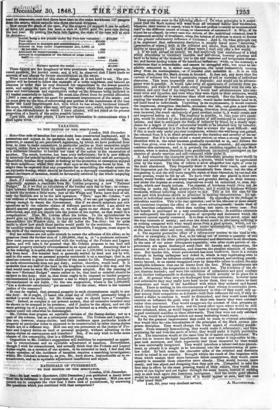TAXATION.
TO THE EDITOR OF THE SPECTATOR.
London, 26th December. ;.%.k ake—Our code-of taxation has past doubt been constructed haphazard, and is anomalous and unjust in its operation both on classes and individuals. This, however, is caused by our patchwork legislation, by which we have preferred from time to time to make concessions, o,partieular parties as their necessities might require, rather than to revise the OSUMI as a whole; and should not be attributed to a deliberate intention to burden one class'of the nation to the exoneration of another. The result, however, has been truly unfortunate; for it is now difficult to ascertain the precise incidence of taxation on any individual; and all are equally dissatisfied, because they persist in looking at the protection or exemption enjoyed by their neighbour, whilst they shut their eyes to the burdens borne by him. It _might then be expected that any proposition for remodelling the whole system on ,am equitable footing, which should be founded on a thorough examination into the `*dual incidence of taxation, would be favourably received by the whole taxpaying -community.
Such, if I mistake not, being the state of public feeling on this point, there un- expectedly appears a manifesto from Mr. Cobden proposing a new " National Budget." In it we find no calculation of the burden each has to bear; no compa- rison between different kinds of taxable property• nothing more than a proposal to botch the system a little more, just as the Whigs and Tories have done of old, only the Radicals are to be the new operators. "Here," says Mr. Cobden, "are ten millions of taxes which can be dispensed with, if we can get together a party =strong enough to daunt the Government. But if we should entertain any nice :f questions as to the relative claims of different parties to relief, I am afraid we should quarrel amongst ourselves; so we will agree on our shares of the spoil beforehand, and will not inquire into the justice of the matter, as that would be a complication." Then Mr. Cobden offers his bribes. To the agriculturists he would give up the Malt-duty, to the hop-growers the Hop duty, to the ten-pound householders the Window-duty, to the old ladies the Tea-duty: but he quite omits to show how much these parties would profit by the remission. However, he candidly states that he wants recruits, and therefore, I suppose, must argue in the style of the recruiting sergeant. But ten millions are not quite enough to secure the adhesion of his allies; so he promises them the further sum of 1,500,0001., that is, at " a moderate estimate." Now most persons are unacquainted with the working of the Probate and Legacy duties, and will take it for granted that Mr. Cobden proposes to tax land and personal property similarly circumstanced to an equal amount. Assuming that to be his meaning, it is quite clear that no such sum as 1,500,0001. is to begot annu- ally from land. For entailed laud is generally settled by deed and not by will, and in the same way as personal property commonly is on a marriage; that is, an absolute interest is given to the children of the tenant for life. Personal property in such circumstances does not pay duty; neither, therefore, would laud. It is probable that one half of the land in the kingdom is entailed in this way, and the rest would soon be were Mr. Cobden's proposition adopted. But the meaning of -7 the new "National Budget" seems rather to be, that land so entailed should be ',subject to the duty; that is, that there ought to be imposed on landed property ,l'•icircumstanced in a particular manner a tax to which personal property similarly circumstanced is not liable. On the one supposition, where is the 1,500,0001. "(on a moderate calculation)" per annum? On the other, where is the vaunted justice of the measure? It may be replied, that personal property in such circumstances ought to pay the duty. So it ought, (I heard the other day of 500,0001. personalty being so settled to avoid the duty); but Mr. Cobden says we should have a " complica- tion." Indeed, so complex is our present system, that all excessive taxation may be shown to be unequal in its pressure; and if justice be the object, and not the mere getting up of a party, the system must be revised as a whole, as the compli- cation could not otherwise be disentangled. Mr. Cobden does propose an equitable revision of the Stamp-duties; not as a part of his scheme, but as a subsequent operation. The Probate and Legacy du- ties are, however, stamp-duties; and their incidence upon particular kinds of property at particular times is supposed to be countervailed by other stamp-duties which act in a different way. How can any one pronounce on the justice of Pro- bate and Legacy duties on land or personal property, without adverting to the stamp-duties on conveyances and transfers; But, if we only wish to bribe some classes of the community, that is a different thing. Opposition to Mr. Cobden's suggestions will doubtless be represented as opposi- tion to retrenchment and an equitable adjastment of taxation. Nevertheless, though I wish for retrenchment, and actually think that the Probate and Legacy duties ought, on a revision of our system, to be extended to land, I feel that the whole question of the incidence of taxation requires a searching investigation; whilst Mr. Cobden's scheme is, as you, Sir, have shown, impracticable as to re-
trenchment, and as to equitable adjustment insufficient and unjust. X.


























 Previous page
Previous page